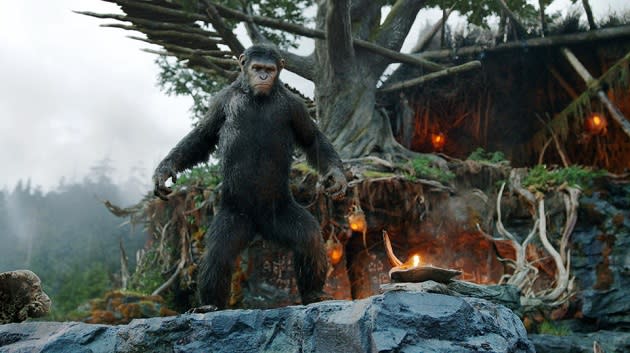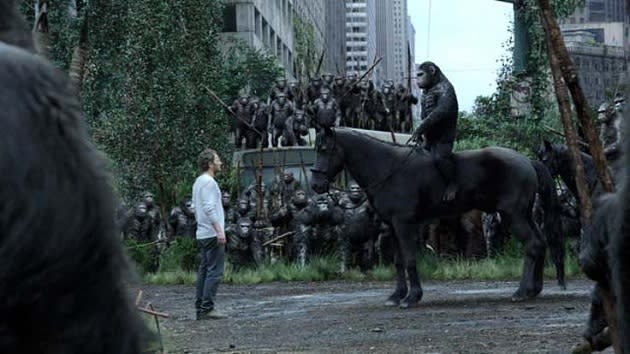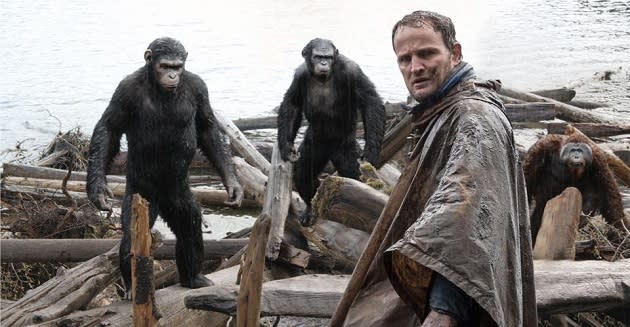Review: Dawn of the Planet of the Apes has apes that are a draw and a flaw

Marcus Goh is a former Singapore television scriptwriter. He's also a Transformers enthusiast and avid pop culture scholar. Tweets/Instagrams at @Optimarcus and writes atmarcusgohmarcusgoh.com. The views expressed are his own.
Secret ending? No.
Running time: 131 minutes (~2 hours)
"Dawn of the Planet of the Apes" is a science fiction film which takes place on a post apocalyptic Earth, which has been overrun by intelligent apes. It is the second in the newly rebooted "Planet of the Apes" franchise. It focuses on the efforts on a group of survivors to make contact with the rest of the world, all while trying to maintain a fragile peace with a nearby group of apes. It stars James Clarke (Malcolm), Andy Serkis (Caesar), Toby Kebbell (Koba), Gary Oldman (Dreyfus), and Keri Russell (Ellie).
The prospect of CGI apes might seem like they're unrelatable characters, but the film does manage to stir genuine emotion in its audiences for the ape protagonists. One thing's for sure — skip the 3D effects. They amount to nothing more than extras walking past the main characters as they talk, or certain random bits of scenery, and it jolts you out of your suspension of disbelief in what is already an improbable premise.
So what's great about "Dawn of the Planet of the Apes?"
Caesar's humanisation
The protagonist of the apes garners our empathy in a way that none of the live, human actors can. Which is to be expected — after all, he is the central character for the franchise (thus far). What is unexpected, though, is the level with which he makes you feel pity and admiration for him. Caesar is as human as any of the other human characters, which is echoed when he realises how much the apes have become like humans.
Apes vs humans battles
It's a spectacular set piece which tops off the movie, featuring an all out battle between the apes and the humans. Apes with machine guns attack and massacre the humans, who afford only a paltry distraction at best. It takes place at night, and it instills you with a genuine fear of the apes and shows you just how deadly they are.
However, several flaws creep in that prevent the movie from connecting with us fully.
The characterisation of the apes as a whole
It's confusing. Do we like or dislike them? Do we sympathise with their cause or hope that the humans win? Are they the villains or the victims of the piece? The movie vacillates between showing them in tender moments of vulnerability, to them revelling in the destruction of all humans. It's one thing to give a well-rounded view of them, but the way they're portrayed makes the apes look like a group of schizophrenic antagonists.
The heavy handed war metaphors
From the middle of Act One onwards, the movie bludgeons you with one straightforward message — peace is good, war is bad. It continues to slap you in the face with this theme again and again, whether it be through grandiose speeches from the apes and humans, or solemn scenes between characters just discussing this theme. There's no subtlety to this message.
The apes look alike — too alike
In group scenes, Caesar is indistinguishable from the other apes. And that's a problem, because the other ape characters have distinctive features, whether it be the scars on River (Caesar's son), the ugliness of Koba, or how Maurice is just a different species altogether. This makes it difficult to locate Caesar sometimes, which again takes you out of the story of the movie.
Too much ape sign language
The apes occasionally speak in sign language and spoken English. It's meant to signify their progression and evolution towards a spoken language, but having to read subtitles adds another layer of distraction on top of the already distracting 3D effects. Just one or two displays would have been enough to drive home the point, but the movie insists on using it all the way until the Act Three.
The apes are both the greatest asset and the greatest flaw of the "Dawn of the Planet of the Apes." Which is understandable, given that is the core premise of the film. It's not a bad movie to watch, but there are other films that are more worthy of your time.
Should you watch this in 3D? No, the effects are distracting.
Should you watch this at weekend movie ticket prices? No.
Should you watch this at weekday movie ticket prices? If you like the Planet of the Apes franchise.
Dawn of the Planet of the Apes opens in cinemas 10 July 2014 (Thursday).




